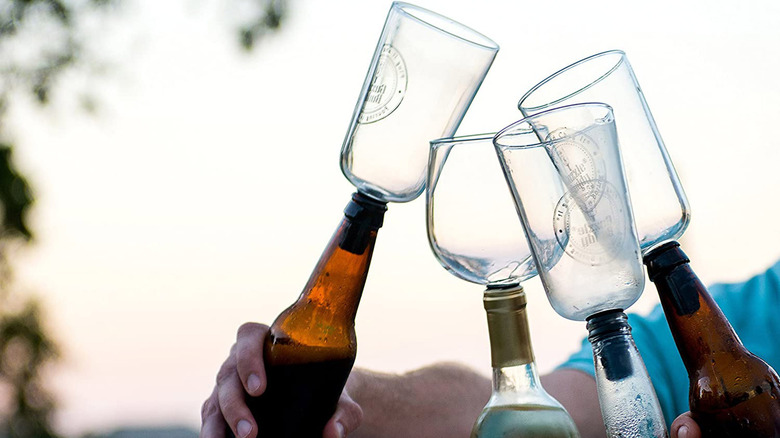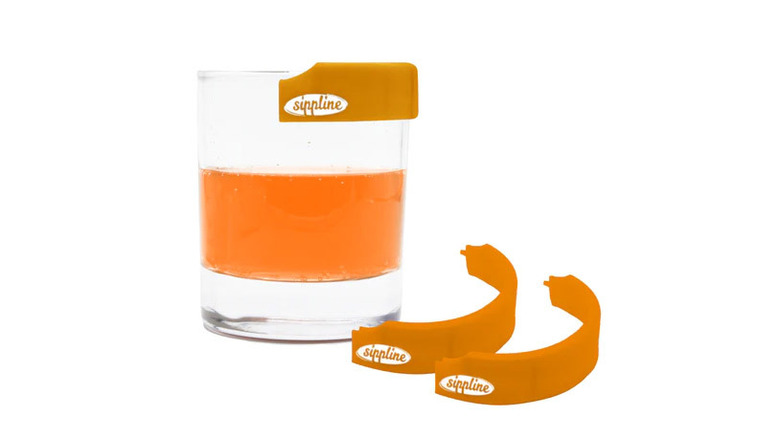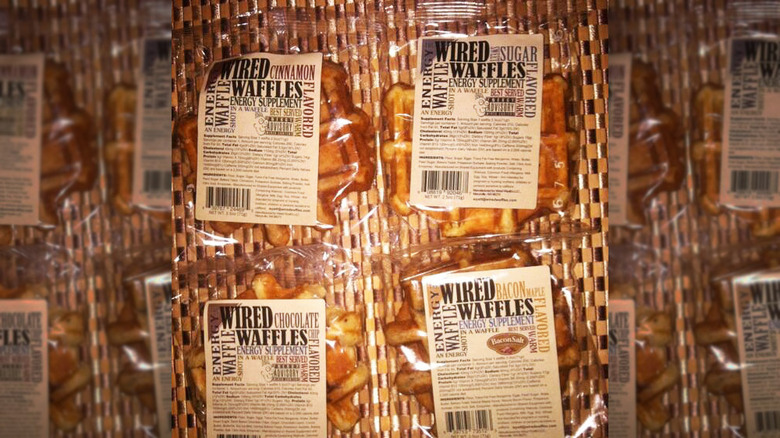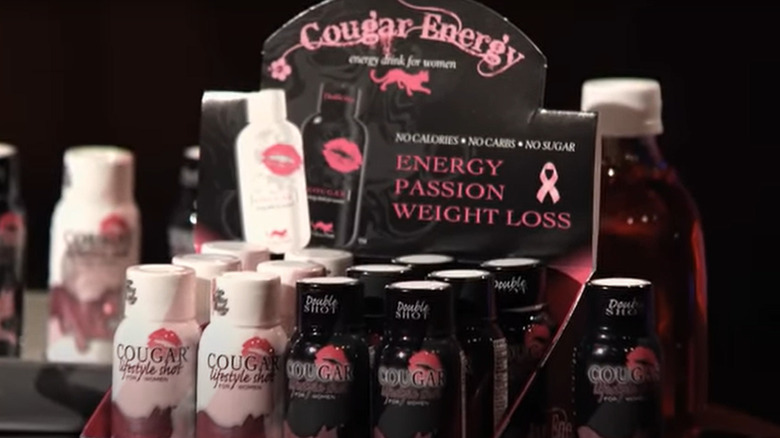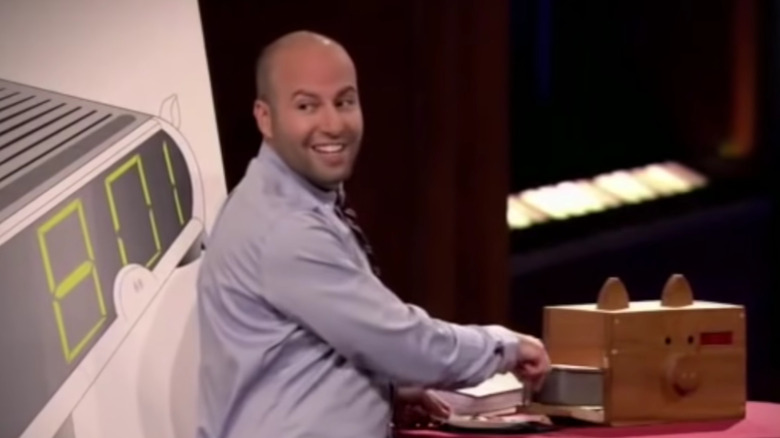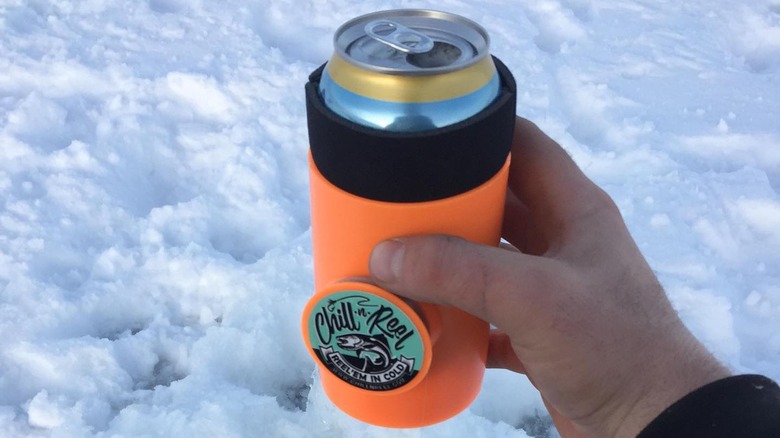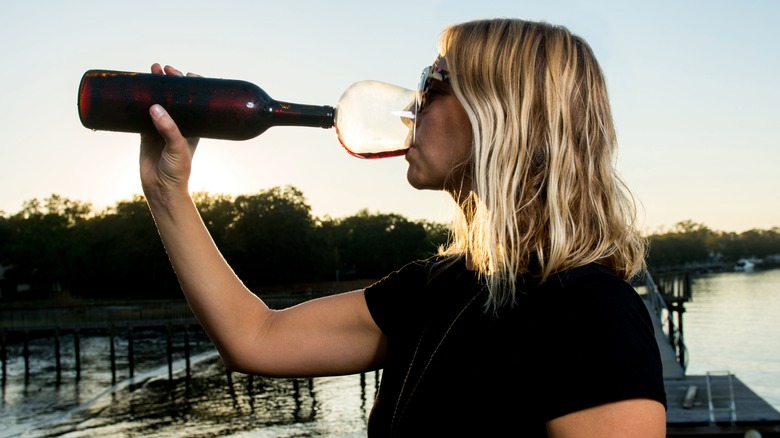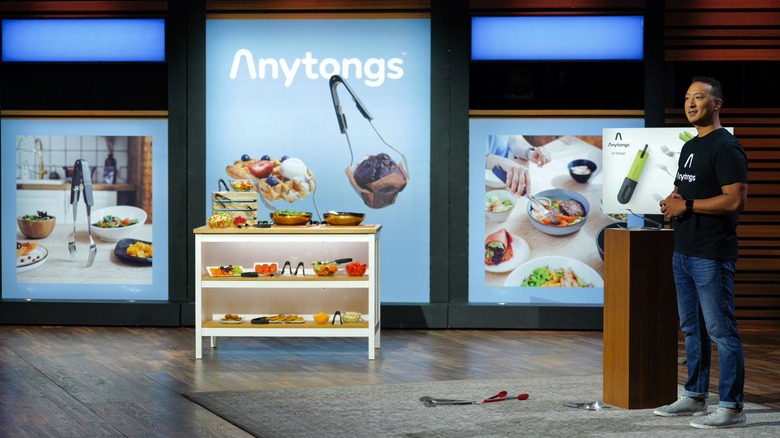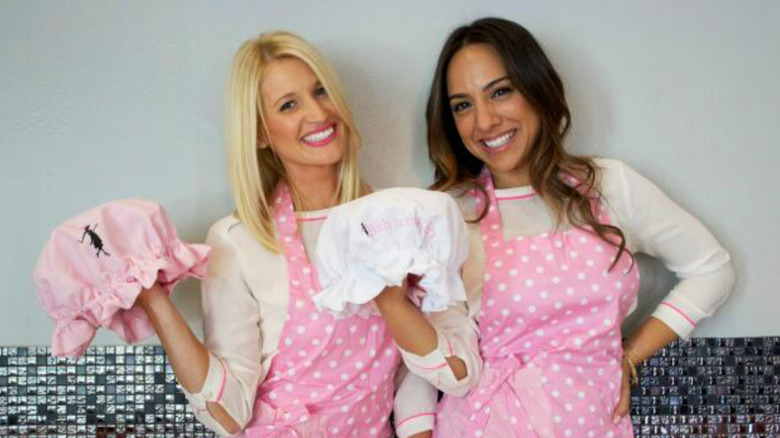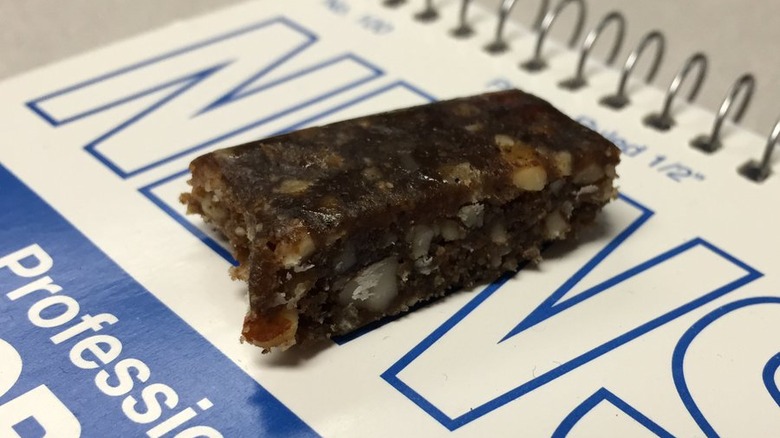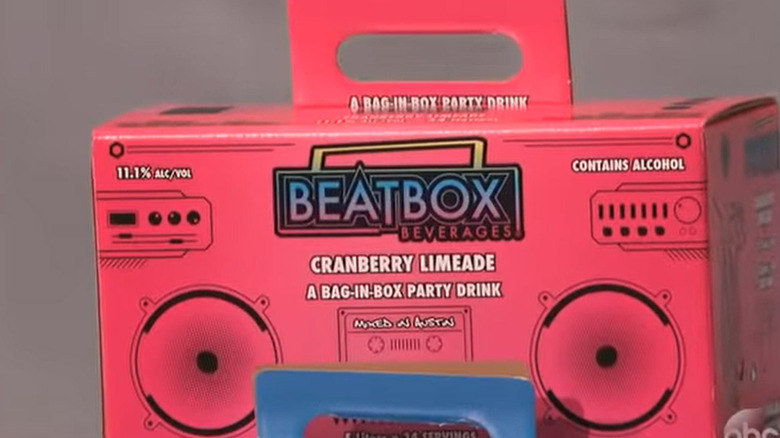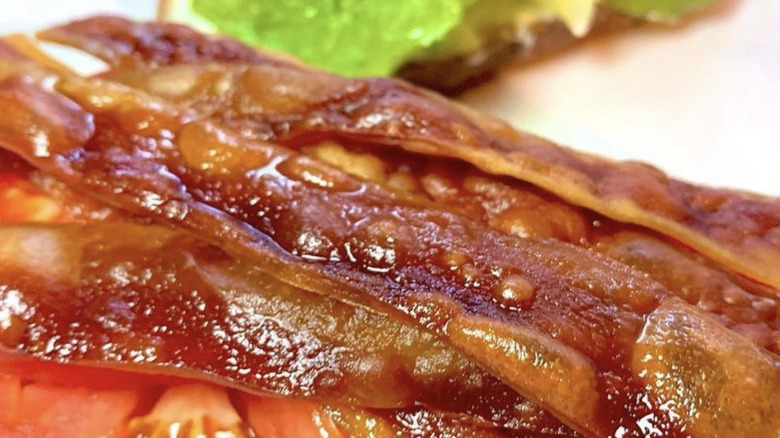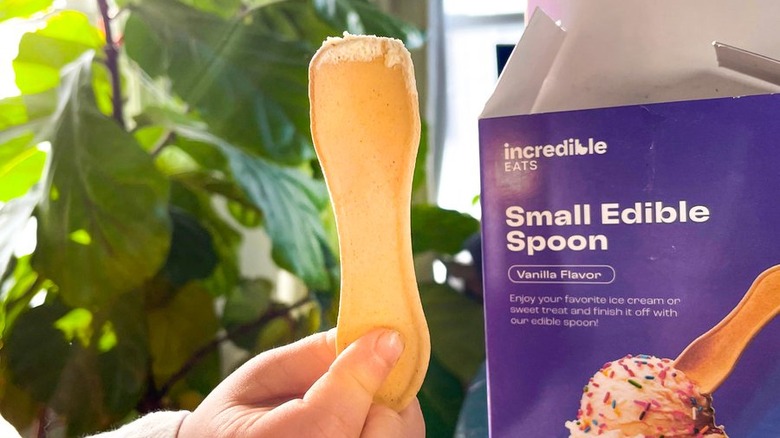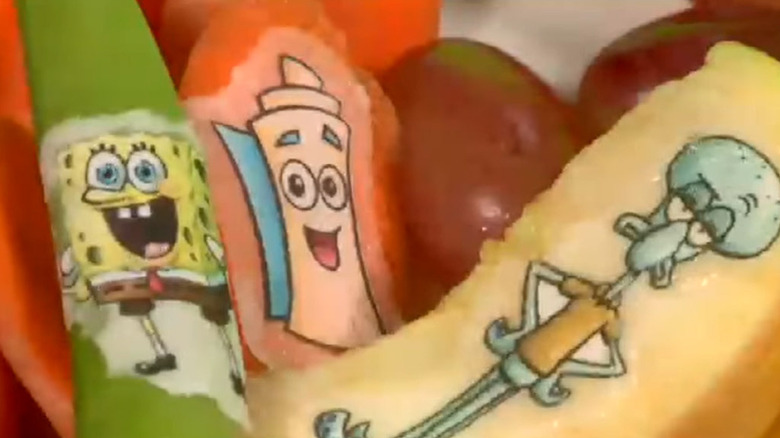14 Most Ridiculous Food Inventions Pitched On Shark Tank
Swimming with the sharks is often saved for the brave, but in the case of entrepreneurs and inventors, it's the next step toward a lucrative business. In this case, the sharks have finances instead of fins, and sharp tongues instead of teeth. Welcome to the show, "Shark Tank."
The American-launched "Shark Tank" premiered in August of 2009 and has drawn inventors from across the country to try and win the favor and financial support of the sharks. The sharks are Mark Cuban, Barbara Corcoran, Lori Greiner, Robert Herjavec, Daymond John, and Kevin O'Leary. (Disclosure: Mark Cuban is an investor in Static Media, the parent company of TK brand.) Since the success of the American show, other countries have followed suit and released their own show with their own local set of sharks. Now, entrepreneurs worldwide can apply to meet their own sharks in over 40 different countries, including India, Australia, England, Vietnam, and Thailand.
The show has attracted its fair share of entreprenurs from the food world. Among the thousands of pitches the sharks have heard, some of those food-related pitches are stranger than others. Here are some of the most ridiculous food inventions pitched on "Shark Tank."
1. Cycling Powered Smoothies
For those who feel like they have to earn their sweet treats and smoothies, entrepreneur Ryan Carpenter pitched the Moberi bike-powered smoothie maker. Carpenter asks the sharks for an investment of $50,000 in exchange for 15% of the company. Moberi's concept is interesting, in that blenders are attached to bicycles, and powered exclusively by pedaling. Carpenter tells the sharks that it's an interactive experience and that people who don't want to cycle their own smoothie to fruition, can have a staff member cycle for them.
Mark Cuban and Daymond John hopped on the bikes to try it out and made the group a couple of smoothies. All of the sharks agreed that the smoothie's taste was exceptional but had a few questions regarding the practicality of the bike blenders. For instance, only blenders would be on the bikes, leaving no non-active alternative to smoothie preparation. Also, they discussed that the cost of the bikes seemed high compared to the profit that could be acquired. In the end, the sharks all praised the clever and inventive nature of the idea but did not invest, as they didn't see the potential for profitable expansion. Since then, Moberi has continued on its venture, and as of March 2022, has two brick-and-mortar locations in Portland and Cedar Hills, Oregon.
2. Sippline: Mask for a drinking glass
Taking a brief journey over to "Shark Tank India," we have a new set of sharp-tongued sharks and a similar number of ridiculous inventions. One such pitch was the Sippline drinking shield, otherwise known as Sippline: The Mask for a Drinking Glass. Inventor Rohit Warrier approached the "Shark Tank India" team in 2020, with a proposal for his oral hygiene-based product, as a revolutionary solution to the sickness-riddled times. It works as a shield for the rim of a glass and is a half circle of plastic that the user would attach to a glass at a restaurant, to form a barrier between the glass (with any of its potential germs) and the drinker's mouth. It is understandable that Warrier would pitch this in the middle of a global pandemic, but that reasoning did not stop the sharks from making a mockery of the product.
India-based shark, Ashneer Grover immediately laughed at the pitch, and insulted both Sippline, and Warrier. He said "I've never seen a more ridiculous product than this in my entire life nor do I want to see" and criticized Warrier's intelligence for even thinking up such a thing. Yikes. Needless to say, Warrier walked away with no deal, and since then has not gained much traction with sales, or any more respect from Grover.
3. Wired Waffles
The night owls and non-morning people were the targets of this invention by Roger Sullivan. Wired Waffles are the caffeine-packed breakfast food that Sullivan pitched as the perfect solution to sleepy mornings when there isn't time for breakfast and coffee. Sullivan says, why choose, when you can have the equivalent of three cups of coffee, in one waffle?
He asked the sharks for an investment of $75,000 in exchange for a 25% stake in the company. The sharks of course, based their assessment on how it tasted, which apparently was no good. Sullivan emphasized that he also has a caffeine-infused syrup to boost the energy and flavor, but apparently, the waffles were dry and as tough to swallow as the concept itself.
Shark Robert Herjavec asked Sullivan if there was anything added to the waffles to make them taste better, which was followed by Kevin O'Leary's harsh prediction the product would get squashed immediately, like the "cockroach that you are," as O'leary put it. The tension quickly turned into a battle among the sharks, which was finally interrupted by Lori Greiner's decision that the risks of children getting their hands on these, made it too much of a liability issue. O'Leary put the final buzz kill on the hyper invention, with the fact that they simply don't taste good, and that's all there is to it. Sullivan left the shark tank with no deal, and likely an injured ego.
4. Cougar Energy
Yet another energy-fueled invention, was the Cougar Energy drink from Ryan Custer. His business plan was intended to cater to older women, otherwise known as "cougars," with his niche-marketed energy drink. Custer's idea was to give women a specific energy drink, perhaps to help them keep up while on the prowl for younger men. He entered the shark tank seeking an investment of $150,000 for 30% of the company. Immediately, questions emerged surrounding the target demographic. Not only was this gender-specific, but also age-specific, and therefore raised concerns about the likelihood of meaningful profit.
Kevin O'Leary tried to pin down the age-range, which Custer clarified was 30-55 years old. O'Leary then teasingly joked with his fellow shark, Barbara Corcoran, saying she used to be a cougar. To some viewers, Custer's pitch might have come off as insulting, ageist, sexist, and pretty ridiculous.
The sharks were not impressed with the taste of the drink and compared it to the other popular brands that are already crowding the energy drink market. In the end, Custer was unable to secure a deal and left the tank empty-handed. Since then, he has shifted his career to real estate, and the arguably ageist Cougar Energy seems to have faded with time.
5. Wake 'n Bacon
Great inventors solve common problems like many people face when struggling to start the day. This isn't always so tough on the weekends when the smell of bacon wakes you up, so why not make that a weekday occurrence? Matty Stalin visited the sharks, to pitch his breakfast-themed alarm clock, Wake 'n Bacon. The unique feature of Wake 'n Bacon is that it does more than your normal alarm clock — it also cooks a slice of bacon for you to wake up to. That's right –- it is an alarm clock, that also self-cooks a slice of bacon.
Stalin asks the sharks for an investment of $40,000 in exchange for 20% of the company. He presents the sharks with his pig-themed bacon clock, and immediately receives questions about liability and safety. Kevin O'Leary mentions that it could catch on fire, whereas Barbara Corcoran mentions it's whimsical, but no one wants raw bacon to be that close to their bed. Finally, the joint concern was that raw bacon sitting out overnight could easily lead to issues with food safety. All in all, the sharks did not embrace the Wake 'n Bacon alarm clock. Since then, Stalin went on to the tech world where he worked as CEO, got into web development, and as of 2022, seems to be in full-stack web development. It is unknown whether or not he uses Wake 'n Bacon to start his mornings.
6. Chill 'N Reel
What goes better together than fishing and beer? Not much, according to Jake Rutledge, his son, and his brother-in-law. They came "fishing for sharks" with the goal of obtaining $300,000 in exchange for 10% equity. With an animated role play, the three men acted out trying to fish while holding their beer, and spilling it everywhere. Introduce, the Chill 'N Reel, which is a beer koozie that mounts to a fishing reel. It's not clear how the Chill 'N Reel truly solves the issue, as in theory, it would still cause a lot of movement to the beer, and probably still result in spills.
Nevertheless, the sharks were entertained, and after some discussion of their sales thus far, Robert Herrjavec decided it was fun and offered $300,000 for 10% plus a two-dollar royalty on each piece that they sold. Rutledge didn't like the idea of the royalty and countered 15% equity instead, but they were at an impasse. Ultimately, the fishermen left with an empty hook, but at least they wouldn't have to spill their beers on their next fishing adventure.
7. Guzzle Buddy Wine Bottle Glass
Fans of the show, "Cougar Town," might be familiar with the episode where Courtney Cox's character demonstrates a product called the "Guzzle Buddy." Based on the idea that pouring wine into a glass takes entirely too long, and is tedious, the show features a wine glass that you attach to the bottle, and chug away. This was meant as a joke on the show, but Jennifer Sullivan and Randy Rothfus took it into real life and marketed it as a product of convenience.
They entered the shark tank with a request for $400,000 in exchange for 25% equity. With some impressive sales numbers under their belt in the door, the sharks were intrigued. A few sharks dropped out for various reasons except for Lori Greiner. She offered them $400,000 for 20% equity, at which point Daymond John rejoined the conversation and offered $400,000 for 25%. Sullivan and Rothfus accepted the offer, and sealed the deal.
Since then, the novelty wine accessory has remained for sale, with sales that seem to be mostly gifts and party favors. It seems that there are some people out there who just can't bear the tedious task of pouring their wine into a separate glass, after all.
8. Anytongs
There are certain kitchen utensils that just drive everyone crazy. Whether it's the act of declaring war on the potato masher that's holding the drawer shut, fervently polishing the always-smudged silver, or trying to meticulously clean every hole in the mesh strainer, certain utensils are more annoying than others. This theory is what prompted Tog Samphel to invent Anytongs. Anytongs is a kitchen accessory that can turn any two utensils into tong utensils.
Samphel met the sharks with a request for $150,000 for 20% equity. He showed them the finesse of turning spoons into spoon tongs, forks into fork tongs, and explained the endless possibilities of revolutionizing the kitchen with tong-based opportunities. With reasonable numbers, but very few sales so far, most of the sharks passed. Daymond John, however, ended up offering Samphel $150,000 for 49% equity. Samphel countered a couple of times, but ended up accepting the shark's original offer, and left with a deal. Today, Anytongs is still in business, and buyers can find Anytongs for sale on their website for $12.99, or in a two-pack for $19.99. Only time will tell if the chefs of the world end up craving the potential to turn all of their utensils into tongs.
9. Kook 'N Kap
Most chefs know the frustration of their dinner smells wafting into their hair, leaving their hair smelling just like their meal. What a common problem, right? Right?! Juli Deveay and Ozma Khan certainly seemed to think so, as this was the foundation of, their Kook 'N Kap invention. With a ruffled edge and a shower-cap-reminiscent vibe, the Kook 'N Kap is their solution to keeping food smells out of their hair. "Hair smells like crap? Get a cap" became their catchphrase, as they flaunted the unique-looking hats.
It's not so much that the "Little Red Riding Hood" granny look is bad, as much as it is, not everyone's style. However, this did not dissuade the Kook 'N Kap ladies from making their pitch, and having shark, Kevin O'Leary model a lovely, pink version.
The ladies asked the sharks for an investment of $50,000 for 20% equity. They claimed that this was the modern version of the traditional chef's hat, although modern doesn't really seem to apply to the Kook 'N Kap style. From confusing cursive lettering on their label to the style, the sharks dive into questioning. One concern emerged when Mark Cuban noticed the flammable warning on the hat's tag. Khan answered that the product is non-flammable, and to basically ignore the tag (okay?). In the end, none of the sharks seemed to find any necessity for the product, and the ladies left without a deal.
10. Cricket Energy Bars
Bug-haters, beware. Inventor and rafting guide Pat Crawley opens his pitch with a joke about frogs being happy because they eat what "bugs" them, and recommends that people do the same with his product, Chapul. Chapul is the Aztec word for crickets, which are the primary ingredient in his protein bars. He pitches Chapul with enthusiasm and explains that people in other countries have utilized insect protein for years with success and environmental benefits. He asks the sharks for $50,000 in exchange for five percent of equity but is met with less than enthusiasm.
As the camera crew zooms in on the creepy jar of live crickets that Crawley brought to join him, Kevin O'Leary in particular immediately turns up his nose, and exclaims "there is no way I'm eating that." In fact, the only shark that didn't immediately pull out was Mark Cuban. It wasn't until Crawley explained the process of turning crickets into flour, that Robert Herjavec rejoined the conversation.
In the end, Crawley received an offer from both Mark Cuban and Herjavec and ended up shaking hands with Cuban, with a deal of $50,000 for 15% of the company to Mark Cuban. After filming, Chapul grew its sales, before ultimately putting the protein bar product on hold. Now, Pat Crawley focuses his business efforts on helping insect farms start up and succeed.
11. BeatBox Beverages
Who doesn't love a beverage with a hint of nostalgia? BeatBox Beverages brings together the simplicity of a boxed wine, with the nostalgic charm of a container that looks like a thrifty boombox. With an assortment of neon colors, co-founders Brad Schultz and Aimy Steadman present their party-in-a-box beverage to the sharks.
The BeatBox beverage is an orange-based boxed wine in different fun flavors like cranberry limeade, blue raspberry, and others. The entrepreneurs share that the boxed mixed drink contains the equivalent of seven bottles of wine, which makes it great for a party environment. The BeatBox team asks the sharks for an investment of $200,000 in exchange for 10% of the company. The sharks taste the wine samples and end up making some offers. Barbara Corcoran offered them $400,000 for 20%, Kevin O'Leary offered them $200,000 for 20%, and Mark Cuban made an offer of $600,000 for 33%. After a counter, the BeatBox creators partnered with Cuban, and walked away with a $1 million deal, in exchange for 33%.
As quirky as it may seem, BeatBox Beverages has since found success. The product hit the shelves of popular grocery stores across the country, and grew substantially in revenue. As of September 2022, BeatBox Beverages became the official drinking partner of Alabama Crimson Tide, with a deal to sell their product at every sporting event. Ridiculous or not, BeatBox Beverages seems to be a big hit.
12. Seaweed Bacon
Meat-eating foodies love the classic and indulgent taste of bacon, and plant-based foods are on the rise for those individuals who don't eat meat. Enter, the questionable and odd, seaweed bacon. Umaro is the name of seaweed that has been transformed from plant to protein and is the bait that co-owners Beth Zotter and Amanda Stiles use to hook a shark.
Both highly educated and eco-conscious women, Zotter and Stiles earnestly present the seaweed bacon to the sharks, in the hopes of attaining $500,000 for two percent of their company. They provide the sharks with samples of a piece right out of the package, and a piece cooked to be crispy. Immediately, Robert Herjavec spat it out. Yikes. He then tried the crispy version that was in a sandwich and agreed that it was not bad in that form.
The business partners argue that Umaro is an eco-friendly option that tastes exactly like bacon, to which Herjavec disagrees. They aim to sell the product at $18 per pound, with the claim that seaweed farming is easier and more cost-effective than other plant alternatives, like soy. Finally, they received multiple offers and ended up making a deal with Mark, for $1 million, and seven percent equity.
13. Edible Spoons
"Willie Wonka and the Chocolate Factory" showed us a magical scene where Gene Wilder drinks out of, and ultimately eats his floral teacup. Perhaps this is what inspired the creator of IncrEdible Eats, Dinesh Tadepalli. His product ranges from edible spoons to edible straws, and each comes with its own flavor depending on the product they will pair with. For ice cream, he suggests a cookie or cone-flavored spoon, for soup, a savory peppered spoon, and for drinks, a flavorless straw. His inspiration is one of sustainability, but one that still might be difficult to bring into the mainstream.
Dinesh aims to replace single-use plastic cutlery with his single-use edible utensils. But, a less-than-ideal feature of his edible spoons is their time limit. For instance, a warm soup or beverage would dissolve the spoon in 25 minutes, so if you're a slow or leisurely diner, forget it. Also, they are made with ingredients like wheat, so may not be safe for those with food allergies.
Dinesh asks the sharks for an investment of $500,000 for seven percent equity. After some back and forth, he agrees to a deal with Lori, and the two agree on $500,000 for 15%. As of January 2022 the deal apparently never closed, but that hasn't stopped Dinesh's progress. Revenue has grown, and as of this year, it was announced that edible chopsticks, coffee stirrers, cups, and bowls are on the horizon. Get ready, world.
14. Edible Stickers
Adults that grew up in the '90s and early 2000s may remember the once popular fruit rollup tongue tattoos, the sticky art that encouraged kids to stick their tongues out at everyone, and the product that parents wished would go away. A newer and just as ridiculous spin on that product is My Fruity Faces, which are edible stickers for kids.
The owners Adam Gerber and Bob Ntoya approached the creation of My Fruity Faces with a health-conscious goal. Their theory was that if edible stickers were placed on healthy foods, perhaps kids would be more drawn to eat the nutritious options, over junk food. They entered the shark tank asking for $200,000 and a 10% stake. However, with a pile of debt, and less-than-impressive numbers, they were not able to get a shark to bite. Since filming, My Fruity Faces has gone out of business and does not appear to be making a comeback anytime soon.
